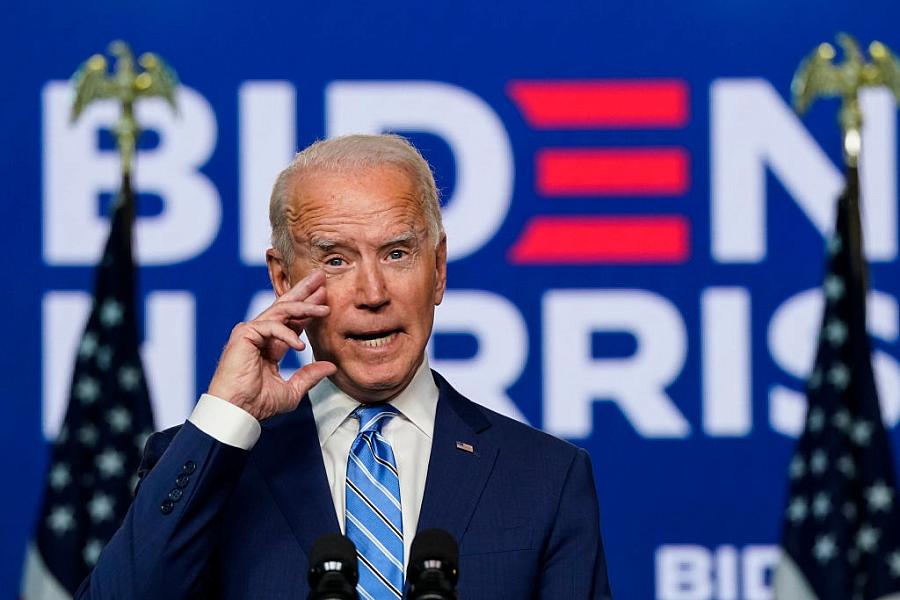Could a Biden presidency still achieve real health reform?

Joe Biden speaks on Nov. 4 in Wilmington, Delaware.
(Photo by Drew Angerer/Getty Images)
With votes still being counted as we speak, President Trump’s potential path to reelection is narrowing. But even if Joe Biden ultimately wins the presidency, the deeply mixed election results suggest that any far-reaching health agenda may once again be a dream deferred. Mitch McConnell seems poised to return as Senate Majority Leader, and the failure of Democrats in the House of Representatives to enlarge their majority there calls into question even the most modest of health system changes — let alone more sweeping and significant proposals, such as Biden’s public option or drug price negotiation in the Medicare program.
Writing in Politico, Ryan Lizza argues that Biden turned the election into a referendum on Donald Trump rather than emphasizing concrete proposals for change. The election did not produce the “scenario many Democrats hoped and prepared for,” Lizza wrote. “They wanted a landslide that crushed Trump and Trumpism and showed a large majority for the Biden agenda.” Biden’s health care agenda comes to mind. Lizza’s observations also help explain the lack of discussion on the stump about serious reform. Sure, preexisting conditions were mentioned a lot and what could happen to sick people if the Supreme Court overturns the Affordable Care Act. (The court will hear the case next week.) But the fact that University of Michigan law professor Nicholas Bagley has said the law “is hanging by a thread” was not sufficiently hammered home during the campaign. I doubt if the crowds listening to the candidates’ stump speeches got the nuance there or really understood what really was at stake if the law was to disappear overnight. The Affordable Care, with its prohibitions on insurance company scrutiny of an person’s health, has grown in importance during the pandemic and may well be an early casualty of the newly conservative Supreme Court in the first months of a Biden administration. The question of what the country would do if the entire law or parts of it were suddenly invalidated hardly ever came up during the campaign.
An unanswered question going forward is whether a President Biden will aggressively push for expanding health insurance through Medicaid. His proposals called for using his new public option to get around the recalcitrance of the 12 mostly southern states that have refused to expand Medicaid. Biden had planned to give states the option of moving those residents who would be eligible for expanded Medicaid into a public option plan. Will a President Biden still push to cover more people in states that did not expand if he is not successful passing a public option? How will his pitch to those states change? It’s way too early to tell.
If the Affordable Care Act is overturned, my prediction is that a divided Congress will scramble to replace it with at least something. But with less of a Democratic majority in the House than expected and a potentially hostile Senate, don’t count on a far-reaching health plan.
Two of the most important health-related issues — shoring up the Medicare Part A trust fund that pays for Medicare beneficiaries’ hospital bills and the Social Security trust fund shortfall — were not discussed much this campaign season either. Both are vital to assuring seniors have enough money to pay for rising health care expenses. Social Security is also a health issue, but you might not have thought of it that way. About 40% of all Social Security beneficiaries rely solely on the program for income, which is used to pay for food and prescription drug out-of-pocket costs, which are clearly health-related expenses. The average benefit is only about $1,500. If shortages in those trust funds are not addressed soon in a new administration, beneficiaries face the prospect of reduced Social Security and Medicare benefits that could leave them in a financial bind that undermines their health.
But Democrats will likely have to curb their broader health policy ambitions. Far-reaching legislation, such as allowing Americans between the ages of 60 and 64 to join Medicare as well as efforts to lower drug prices through Medicare, will be tough slogs. Opposition from stakeholders fearing government intervention or expanded entitlements will be fierce, and without a unified wall of Democratic support in the House and Senate, Americans expecting relief from high medical bills will be disappointed.
My crystal ball says that COVID-19 will continue to be the major health care topic until a safe and effective vaccine becomes widely available. That doesn’t mean, however, that we journalists who toil in the fields of health policy should abandon covering all the other problems that we know need fixing. I like to think that as the country tries to repair itself, we journalists, too, can work harder to make these knotty health policy issues more meaningful and comprehensible in the divided universe the election has again revealed.
Veteran health care journalist Trudy Lieberman is a contributing editor at the Center for Health Journalism Digital and a regular contributor to the Remaking Health Care column.

